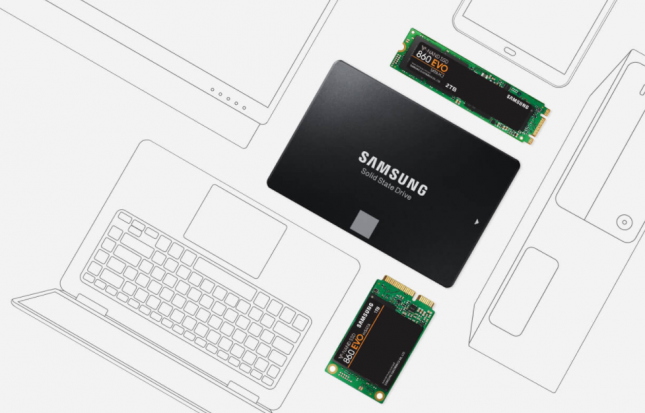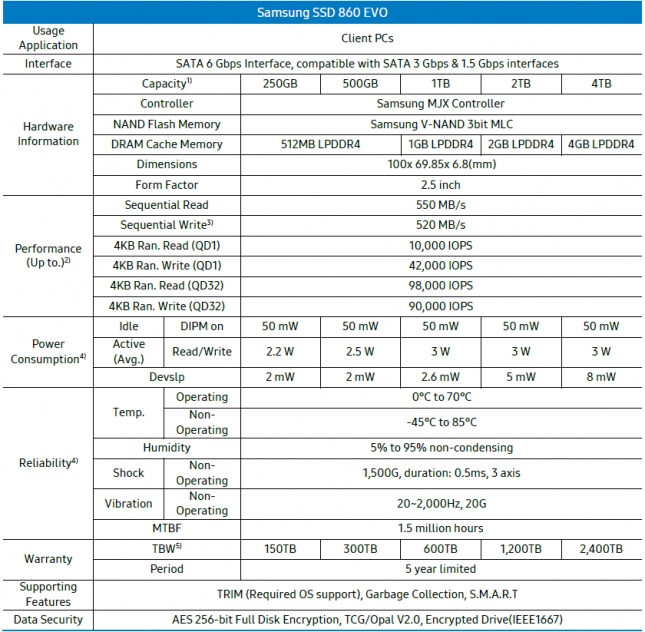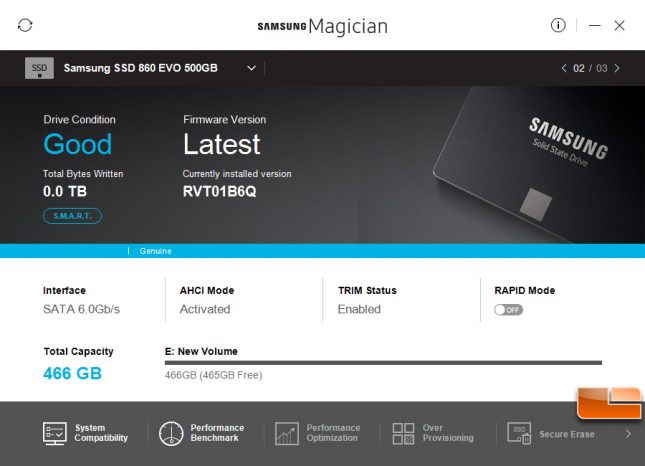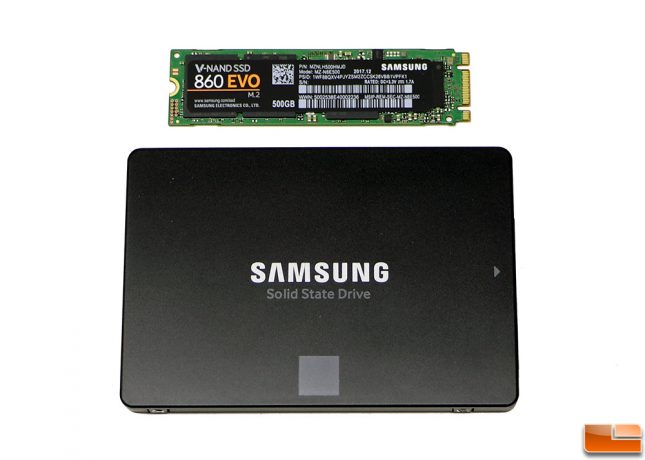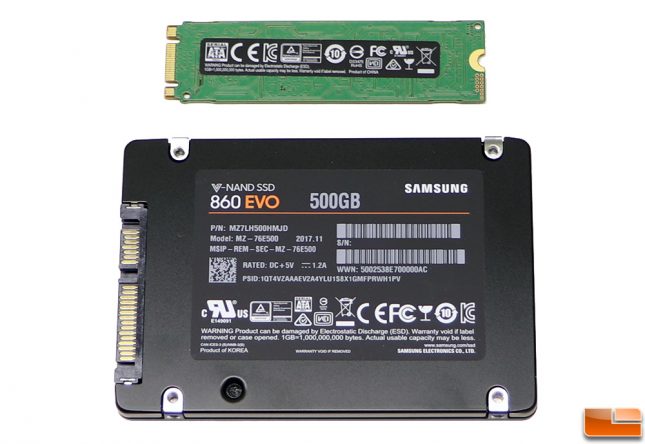Samsung 860 EVO 500GB SATA SSD Review
Samsung 860 EVO Aims For SATA III Performance Perfection
Very few would have thought when the Samsung 850 EVO Solid-State Drive series came out in 2014 that it would be come the number #1 best-selling SSD in the world at the end of 2017. Every storage editor and enthusiast would have laughed at you back in 2014 if you told them that the successor to that drive wouldn’t be coming out until 2018. Yet, here we are in Q1 2018 and Samsung has only now introduced the 860 EVO series. It honestly took four years for the competition to catch up or come close to being able to match the performance of the 850 EVO. The good news for Samsung is that they have had years to prepare for this day and have armed the 860 EVO with the new Samsung MJX controller along with their latest Samsung V-NAND 3bit MLC (Samsung marketing spin for TLC).
The Samsung SSD 860 EVO series is designed for mainstream desktop and laptop use. Form factors for the series will include 2.5-inch SATA drives in 250GB, 500GB, 1TB, 2TB and 4TB capacities, mSATA drives in 250GB, 500GB and 1TB capacities and then finally M.2 SATA drives in 250GB, 500GB, 1TB and 2TB capacities. This means Samsung has pretty much every desirable capacity offered and at a wide range of price points. The Samsung SSD 860 EVO 250GB starts at just $94.99 shipped and for those that need mass storage the 4TB model tops out at $1,324.57 shipped. The sweet spot here in 2018 would be the 500GB drives at $149.99 and the 1TB drives at $289.99. You can finally get a 1TB Samsung EVO series drive for under $300. When the Samsung 850 EVO 1TB drive came out in 2014 it had an MSRP of $499.99, so in roughly four years pricing on mainstream SSDs have been slashed nearly 50%!
So, how much better is the new Samsung SSD 860 EVO series over the Samsung SSD 850 EVO series when the SATA III interface has been holding back performance for years? Peak performance numbers have not changed much as the 860 EVO is rated as having up to up to 550 MB/s sequential read and up to 520 MB/s sequential write speeds. The old 850 EVO series had read/write speeds of up to 540/520 MB/s, so there is just a slight performance bump there. 4K QD32 Random read/write speeds remain exactly the same at to 98,000 IOPS read and 90,000 IOPS write.
The big changes for performance on the 860 EVO series is that the TurboWrite region has been expanded by up to 6 times to help avoid sudden write performance drops during large file transfers. The TurboWrite buffer size varies based on the capacity of the SSD; 12 GB for 250 GB model, 22 GB for 500 GB model, 42 GB for 1 TB model and 78 GB for 2/4 TB models. Samsung says the 860 EVO has 51% better sustained write performance as a result. Samsung also refined the ECC algorithm for the new MJX controller to keep performance as close to the SATA III interfaces limits as possible. Part of the software tweaks in the firmware are improved queued trim commands for Linux users. All these improvements have allowed Samsung to increase the endurance ratings on the drive. The 860 EVO series has up to a 4 times higher Total Bytes Written (TBW) rating over the previous 850 EVO series.
The Samsung SSD 860 EVO series comes with Samsung Data Migration and Magician Software with the purchase of the drive. That means you can easily clone a good drive from an existing system with ease if needed and then manage the 860 EVO once it is up and running. This utility also automatically updates the firmware automatically and will allow you to create a bootable USB drive to secure erase if down the road if you ever want to wipe the drive before selling it or for whatever reason you have.
Samsung released a launch trailer for the SSD 860 PRO and SSD 860 EVO series that has 8.8 million views in less than 60-days! Impressive numbers, but one has to keep in mind that Samsung has over 35% of the SSD market share when it comes to global units shipped. Second place would be SanDisk/WD at over 16% and third place would be Intel at just over 10%. Toshiba and Micron/Crucial are tied at fourth place with just over 8% market share. Who knew over 8 million people would be watching SSD promotional videos!
Samsung SSD 860 EVO Series Features:
- Controller: Samsung MJX
- 3D NAND: Samsung V-NAND 64-layer 3-bit MLC
- Interface: SATA III 6Gbps
- Form Factors: 2.5-inch
- Capacities: 250GB, 500GB, 1TB, 2TB, 4TB
- LPDDR4 Cache: 512MB (250GB/500GB), 1GB (1TB), 2GB (2TB), 4GB (4TB)
- Data Protection: AES 256-bit Full Disk Encryption. TCG/Opal V2.0, Encrypted Drive (IEEE1667)
- Sequential R/W (MB/s): 550/520
- Random R/W QD1 (IOPS): 10k/42k
- Random R/W QD32 (IOPS): 98k/90k
- Idle Power: 50 mW (all capacities)
- Average Active Power: 2.2 W (200GB), 2.5 W (500GB), 3 W (1TB, 2TB, 4TB)
- DevSleep Power: 2 mW (250GB/500GB), 2.6 mW (1TB), 5 mW (2TB), 8 mW (4TB)
- Life Expectancy: 1.5 million hours MTBF
- Endurance:
- 250GB – 150TB
- 500GB – 300TB
- 1TB – 600TB
- 2TB – 1,200TB
- 4TB – 2,400TB
- Warranty: 5-year, limited
Today we’ll be taking a look at the Samsung SSD 860 EVO 500GB 2.5-inch SATA SSD that is sold under part number MZ-76E500B/AM for $149.99 as well as the Samsung 860 EVO 500GB M.2 SATA SSD that is available under part number MZ-N6E500BW for $169.99. Both of these drives have an MSRP of $169, but the street price is difference on the two models. The performance ratings on these drives are virtually identical. They are both rated for sequential read/write of up to 550 / 520 MB/s and have 4K Random Read/Write QD1 speeds of up to 10k / 42k IOPS. The only difference between the 2.5-inch model is that the 4K Random Read/Write speeds are 98k / 90k IOPS and the M.2 model comes in slightly slower at 97k/88k IOPS. In order to keep our charts simple we’ll only be benchmarking the 2.5-inch model.
The performance ratings on these drives are virtually identical. They are both rated for sequential read/write of up to 550 / 520 MB/s and have 4K Random Read/Write QD1 speeds of up to 10k / 42k IOPS. The only difference between the 2.5-inch model is that the 4K Random Read/Write speeds are 98k / 90k IOPS and the M.2 model comes in slightly slower at 97k/88k IOPS. In order to keep our charts simple we’ll only be benchmarking the 2.5-inch model.
Let’s take a look at some benchmarks of this drive!

